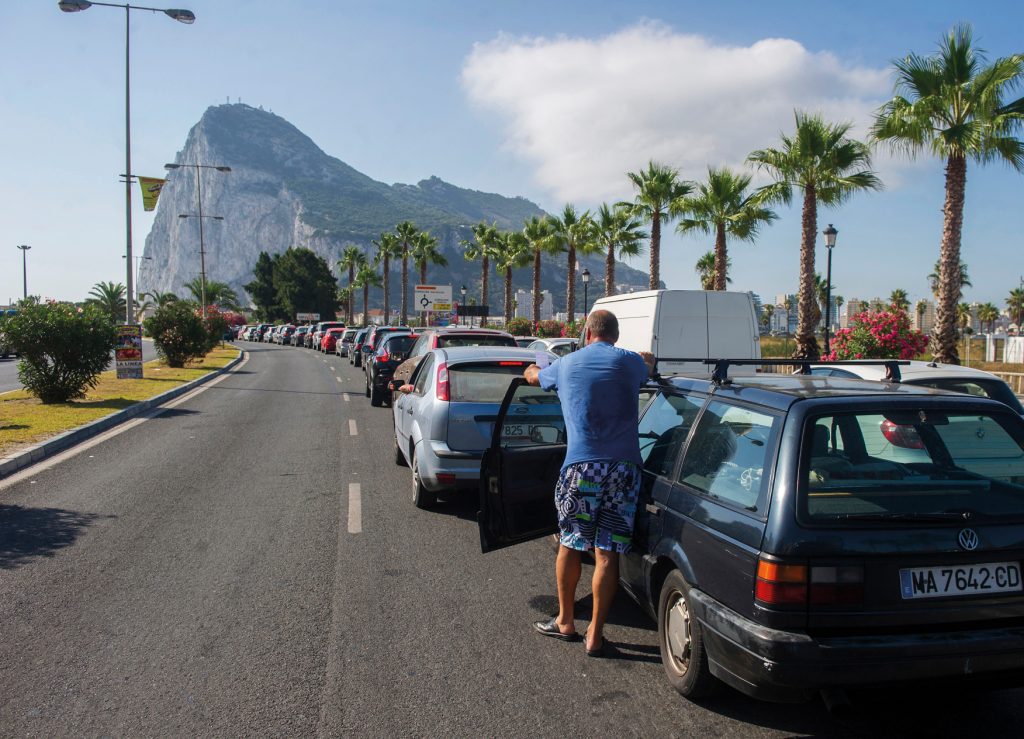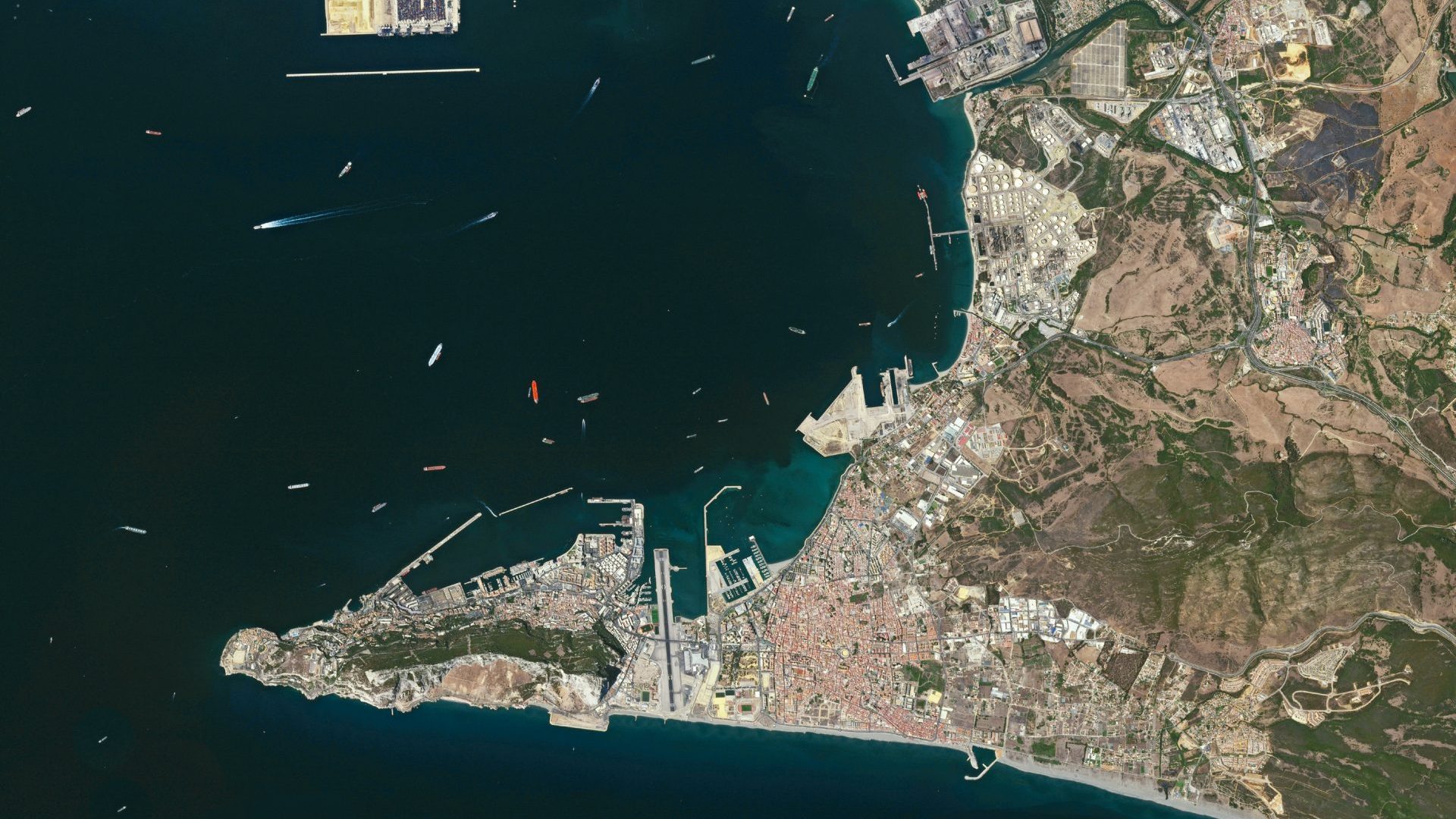It has been nearly four decades since Carmen Ward, a Gibraltarian, stepped through the iron gates separating Gibraltar from Spain, ending a blockade that had isolated residents of the British colony on the isthmus for 13 years.
The days when Spanish and British border guards squared up against each other across the verja (gate), as they did between 1969 and 1982, are long past. But the prospect of a return to a hard border still hangs in the air while post-Brexit negotiations between the UK and the European Union over the future of the Rock drag on.

It’s hard not to draw parallels between these talks and the negotiations over what to do about avoiding a hard border between Ireland and Northern Ireland. Their fates appear to be intertwined; any further souring of that agreement would inevitably have a knock-on effect for Gibraltar, given that it involves the same negotiating teams, according to Antonio Barroso, managing director at the political risk advisory firm Teneo. Acrimony over Northern Ireland, where the UK is seeking to renegotiate already-agreed terms with the EU and threatens to invoke Article 16, “inevitably pollutes the negotiations over Gibraltar,” he said.
But wasn’t all this sorted out when Spain and the UK reached a bilateral deal in December 2020? The answer is no – the accord must still be ratified with the EU, which is demanding changes. The European Commission set out its position in a mandate last July, and an agreement was supposed to have been reached by December. That didn’t happen, but foreign secretary Liz Truss promised it would be done by the end of the first quarter of this year. She now has a little over six weeks left to negotiate it, while possibly also kicking off her own leadership campaign.
As with Northern Ireland, the wrangling is over the practicalities of the border. A hard border would be a body blow for Gibraltar, given that nearly half of its 30,000-strong workforce are “frontier workers” – people who live in Spain but commute to work in Gibraltar. That number includes more than 2,200 Britons and over 300 Gibraltarians. The majority are Spaniards.
The current proposal is to pull the border back to the airport and port, drawing Gibraltar into an arrangement that would – in practice – make it part of the EU’s Schengen area and customs union. That would ensure the survival of Gibraltar’s economy, and even boost it, but would also require adjustments on concepts of sovereignty. The colony would also have to relinquish some of its competitive advantages on tax and regulations. Even in Gibraltar, dreams of a low-tax, deregulated Brexit are foundering against the reality of a need to maintain open borders with continental Europe.
The new border would be operated by Frontex, the EU’s border management agency, meaning UK passport holders would need to pass through controls operated by a third party when travelling to a British territory. The EU is also proposing that Spain oversee the assigning of shortand long-term visas for residency in Gibraltar, while the UK will not have access to the border control’s immigration databases. Spanish officials will also be able to carry out checks on goods arriving in Gibraltar’s port, according to the mandate.
Gibraltar’s chief minister, Fabian Picardo, told a UK parliamentary committee in November he expected that third-party travellers requiring a visa would have to apply for visas both from Gibraltar and from the Schengen-area country they planned to travel on to.
The EU has already made a compromise: the original proposal had Spanish officials guarding the borders, something Gibraltar said was unacceptable. But some question whether this is a sustainable, long-term solution.
Frontex was not designed for this. Its main role is to assist host countries in the bloc’s migration stress points. It currently has 600 personnel in Greece, where it helps Greek security officers to identify and register migrants entering from Turkey as well as with cross-border crime. It also has operations in Italy, the Western Balkans and in Spain’s African enclaves, helping those countries to manage the influx of migrants.
Taking on the responsibility for passport control would mark a new role for Frontex and one that may not be sustainable in the long term, said Fernando Eguidazu, a former state secretary for the European Union for Spain and co-author of the book Gibraltar: the Second Surrender: Keys of an Historic Conflict.
While EU law says that the buck ultimately stops with its member states, Eguidazu says: “Frontex is a reinforcement for those countries that have border problems, so the one who is responsible, I insist, is Spain, whether we like it or not. At some point, this will end and there will have to be Spanish officials and then, either the relationship has already relaxed so much that they no longer care, or the agreement will end.”
Spain and the UK have been fighting over Gibraltar since 1704 when Sir George Rooke captured the Rock for the British during the War of the Spanish Succession. Spain ceded the territory to Britain nine years later in the Treaty of Utrecht, but has made several attempts to win it back, most notably during a four-year siege starting in 1779. For Britain, Gibraltar’s location at the confluence of the Mediterranean and the Atlantic made it a useful military base for monitoring shipping, especially once the Suez Canal had been constructed.

Spain’s claim on the territory continued into the 20th century with Franco’s government pressing to win it back, culminating in the blockade of the border from 1969 to 1982. In 2013, a dispute over fishing rights led the Spanish government to tighten border checks, prompting complaints from the UK.
In recent years, while Spain has maintained its sovereignty claim over the isthmus, its focus has shifted on to what it sees as unfair competitive advantages enjoyed by Gibraltar that undermine the local economy in the so-called Campo de Gibraltar.
Brexit has provided an opportunity for Spain to level the playing field. With the UK now out of the EU, the bloc is throwing its weight behind Spain, allowing for negotiations over the future relationship to be separated from the main accord reached between London and Brussels.
Gibraltarians find themselves in a difficult position. Repeated referendums have shown an overwhelming desire to remain British, but they also know that their economic future is tied to Europe and an ability to maintain open borders for migration and trade. This was reflected in the referendum on Brexit, in which 96% of Gibraltarians voted to remain. “Something has to give and I think Spain is well aware of this,” said Barroso of Teneo. “This is an opportunity to rebalance the relationship.”
To join the customs union, Gibraltar will have to give up some of the low-tax advantages that have made it a popular destination for offshore companies. It will probably have to introduce VAT for the first time, which may not make much difference to imported goods – which are subject to Gibraltar’s system of import duties – but could harm its online gaming industry if it is also forced to pay the tax.
Since leaving the European Union, Gibraltar has struggled to stock its supermarkets with British products, since most of them come overland and have been hampered by sanitary checks and duties. Picardo, the chief minister, said he hoped Gibraltar would be able to come to a similar arrangement with the EU as the one reached in Northern Ireland over products such as sausages.
“The two are completely separate, but in the context of this particular issue – the movement of the Great British banger from the United Kingdom into the common customs territory of the European Union – those issues will be similar whether the sausage is coming across the frontier from Northern Ireland into Eire, or from Eire, Northern Ireland or Great Britain, through the European continent to Gibraltar,” Picardo said in November.
Spanish suspicions that Gibraltar operates as a tax haven have often exacerbated tensions. That was probably true until 2010 when Gibraltar reformed its tax regime, abolishing a dual system that allowed offshore companies to pay no tax, said Edgar Lavarello, a partner at PricewaterhouseCoopers in Gibraltar who helped to draw up the new tax system.
The rate was set at 10% and raised to 12.5% in August 2021. Picardo has hinted strongly that it will rise again to 15% in the future to meet the Organisation for Economic Co-operation and Development’s push for a global minimum rate for multinationals.
Gibraltar is one of 139 countries or jurisdictions that supports the OECD’s framework. Gibraltar’s economy depends on it having a low tax rate, but it doesn’t necessarily have to be the lowest, Lavarello said. He said Gibraltar instead is shifting towards a model based on tax efficiency, harnessing its size to keep its tax regime simplified and more flexible. Small means agile and the ability to fast-track legislation while offering the attraction for companies of easy access to regulators and key decision-makers.
“We need an open border and we need the flow of people crossing the border on a daily basis but, at the same time, we want to remain out,” Lavarello said. “We want to keep our autonomy on tax-setting and so on; because we are a very small territory, things can actually be done very fast.”
Gibraltar has in fact already been moving to align with the EU on other tax issues. A tax treaty between Spain and Gibraltar came into force in March; Spain has said it will remove Gibraltar from its tax haven blacklist, though it has not done so yet. The treaty seeks to clarify the grey area of tax residency for cross-border workers and to increase tax data-sharing to prevent Spaniards and Spanish companies from using Gibraltar to evade taxes.
Louis Montegriffo, managing director at the Gibraltarian property company BMI Group, said more transparency from Gibraltar on tax issues could be a boon for business. The tax agreement with Spain has meant people can’t hide anymore, saying they’re Gibraltar residents while living in Spain.
“That’s led to a more serious Gibraltar from the point of view of how we’re seen,” Montegriffo said. People can no longer “have their cake and eat it, which I think is fair”.
Spain also complains about contraband tobacco from Gibraltar, where prices are significantly cheaper. About half of Spain’s 2.6 billion cigarette imports come from Gibraltar, according to KPMG, which estimates that about a third of those are contraband.
Gibraltar and Spain in 2018 signed an agreement to try to curb the illicit trade in cigarettes. Gibraltar agreed to raise prices on its cigarettes to keep the differential at no higher than 32%. Because of the disruptions caused by the pandemic to trade and tourism, it’s hard to gauge to what extent the measure has worked, but KPMG said inflows from Gibraltar to Spain fell by 250 million cigarettes in 2020.
The EU is also pushing for Gibraltar to tighten environmental regulations. Bunkering, or the refuelling of ships, is one of Gibraltar’s main economic sectors. Spain has complained that Gibraltar’s use of permanent floating platforms to supply fuel is damaging to the local environment and gives it a competitive advantage over Spanish ports that refrain from the practice. Gibraltar has argued that its bunkering services are legal and meet EU regulations. But in the mandate it published in June on the negotiations, the EU made special mention of the need to align regulations on bunkering so that “Gibraltar competes fairly with other European ports, in particular the port of Algeciras” across the bay in Spain.
“Bunkering operations have changed considerably in Gibraltar over the last 10 years,” a Gibraltar government spokesman said. “Today the operational logistics are the same in Gibraltar as in any nearby Spanish port: bunkers are conveyed from a shore-based storage facility to the client ships by specialised barges.”
The risk is that lax regulations can lead to oil spills, such as the one that occurred during a bunkering operation in February 2021, which spilled 2,000 litres into the sea, mainly in Gibraltar’s harbour, according to the government.
The owner of the AM Ghent, a Libyaregistered bulk carrier, was forced to pay a £1.5 million bond to cover costs for the cleaning operation.
Spanish environmental NGO Ecologistas en Acción reported the spillage to the EU, saying it was another example of regulations to protect the Gibraltar Straits being ignored.
The tax agreement was the first treaty signed between Spain and Gibraltar in more than 300 years. BMG Group’s Montegriffo said Brexit had forced the two governments into communicating in a way that would have been unthinkable even a decade ago. Gibraltar was forced to cut out the middleman as the UK continued to bicker with the EU over other areas of the divorce.
“If you had said 10 years ago to me that we’d have our chief minister, our financial secretary and our attorney general regularly going to Madrid and having meetings at the top level with Madrid, I’d have laughed,” Montegriffo said.
The deal depends on whether both sides can avoid antagonism from the Northern Ireland negotiations contaminating the talks and whether the UK and Gibraltar can stomach the border being run by a third party. The removal of a source of tension for more than 300 years could improve the economic prospects for both Gibraltar and its neighbours in the Campo de Gibraltar, said Barroso.
Without those frictions “you can create some sort of common prosperity that might mean that in 20 years’ time nobody even remembers the border,” he said. But that will only happen if ideological differences can be overcome. And as we’ve learned with Brexit so far, that’s a big if.



